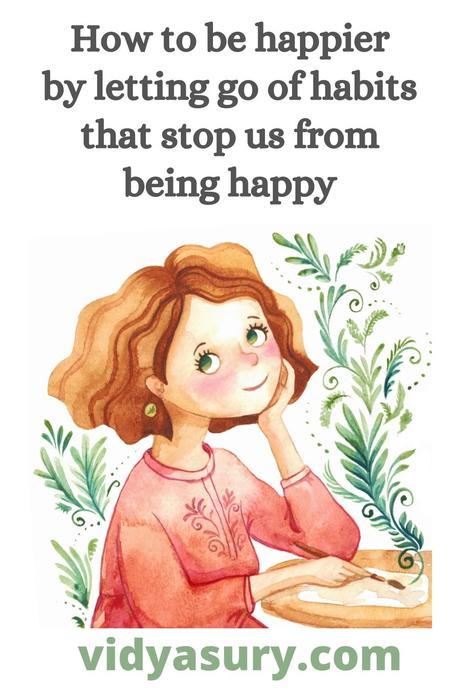We would all like to be happier, right? And yet, there are times when it seems like the Holy Grail. We look and look. What is the secret? See if this little parable resonates with you:
One day the Creator gathered all the animals and said:
'I want to hide the secret to a happy life from humans until they are ready for it.'
'Give it to me. I'll fly it to the moon,' said the Eagle.
'No, one day soon they will go there and find it.'
'How about the bottom of the ocean?' asked the Salmon.
'No, they will find it there too.'
'I will bury it in the great plains,' said the Buffalo.
'They will soon dig and find it there.'
'Put it inside them,' said the wise grandmother Mole.
'Yes,' said the Creator, 'it is the last place they will look.'
(The Secret to a Happy Life ~ Native American parable)

There are as many definitions or experiences of happiness as there are people. Finding our own brand of personal happiness is a bit like appreciating art - it's subjective, but we know it when we see it.
Though happiness is unique to each of us, one commonality from this research is that people have control over their own happiness (or unhappiness). We can measure it, control it, and learn to cultivate it. In other words, we can proactively train ourselves to feel happy.
Although happiness can be a tricky concept, it is becoming increasingly possible to crack the code, both in the bigger picture, and in hands-on ways that make a difference in your daily life.
What is happiness?
Is it a state of mind? A philosophy?
Is it an emotion that we can manage like anger and sadness?
" Happiness is the meaning and the purpose of life, the whole aim and end of human existence." ~ Aristotle.
Aristotle, the philosopher, split the concept of happiness into two broad parts:
- Hedonia: the feeling of pleasure, enjoyment, and satisfaction and the absence of stress and distress.
- Eudaimonia: a good life based on authenticity, personal growth, while contributing to a purpose larger than oneself.
Based on this, psychology professor Dr. Martin Seligman University of Pennsylvania identified three dimensions of a happy life:
- The Pleasant Life (pleasure seeking). Looking for opportunities to maximize feelings of pleasure while minimizing feelings of pain.
- The Good Life (engagement). Seeking happiness by using our signature strengths to fulfill our desires by pursuing our passions.
- The Meaningful Life (wellbeing). Finding happiness using one's strengths, abilities, and passions in the pursuit of and service towards a greater good.
While happiness is individual, it is also universal. Happiness has become recognized by the United Nations as a key measure of social progress in the world. The World Happiness Report ranks 155 countries by their happiness levels.
And while we may be better off today than in the past with access to advanced medicine, technology, information, healthy food, and live in a time of unprecedented freedom and opportunities, so many of us are still so unhappy.
Why are we still unhappy?
We stick with jobs we dislike, relationships that are unhealthy, are cynical about our institutions, and burden ourselves with attaining and maintaining 'stuff'.
Basically we're overextended, underappreciated, have fewer social supports, and feel more uncertain than we have in over a decade.
And how to we respond to this status?
We put our heads down, roll up our sleeves, and work harder.
it is the perfect recipe for ensuring that happiness comes nowhere near us.
How can we be happier?
We can learn ways to respond to our situations and find ways to create and promote our happiness.
Positive Psychology suggests that each of us is born with a 'set-point' for happiness. Some of us are naturally wired to be happier than others. While our set points remain relatively constant, evidence suggests they increase or decrease depending upon our interpretation and responses to events. Though our DNA, genes, and personality traits influence our happiness levels, we do have control over our own happiness.
What's the catch, then?
Just wanting to be happier won't make it happen. The happiest people are the ones who take charge of their attitudes, thoughts, feelings, and behaviors.
Bottom line? Happy people are intentional.Isn't it empowering to know that we have the power to create our own happiness? But before we create new happiness habits, we need to get rid of habits that stop us from being happy.
What are these habits that we need to let go of to be happier?
Stop thinking that life is hard
If happiness is a choice, so is our belief that life is hard. Not saying minimize obstacles and tough situations, but we can choose to think that life is easy because life is what we want it to be
True, it is hard to trust people but constantly being distrustful can come in the way of our relationships and our happiness.
Don't keep comparing yourself to others
Comparison is the thief of joy. We cannot determine our worth based on someone else's accomplishments because it is just not fair.
Don't try to control life
Forcing a result is stressful. It is better to allow things to unfold naturally.
Stop living in a fantasy world
Daydreaming is fine, but studies indicate that this can sometimes contribute to our unhappiness. We are likelier to be happy when our minds focus on what we're doing in the present moment.
When we let go of these habits that come in the way of our happiness, life becomes simpler, making room for new happiness habits.
What are these new happiness habits?
Let's understand what happens in our brains when we're happy or unhappy.
The limbic system is the part of the brain that controls our motivation, behavior, and emotions. It's a survival mechanism that produces chemicals that let our bodies know what's good (and bad) for us.
A "DOSE" to be happier
How do you boost your 'feel good' brain chemicals? By tapping into these four main chemicals: dopamine, oxytocin, serotonin, and endorphins (DOSE).
While daily events and situations trigger these neurotransmitters automatically, there are ways to encourage the brain to produce them - allowing us to create (and repeat) feelings of happiness. When those chemicals are released we become more motivated, productive, and experience greater wellbeing.
A word about these chemicals
- Dopamine also, called the 'happiness drug' is responsible for motivating us to take action, make decisions, and feel pleasure when we reach our goals. Dopamine is the brain's way of patting us on the back for a job well done. If you are experiencing procrastination, self-doubt, or lethargy, low dopamine levels could be to blame. Increase dopamine levels by dividing your larger goals into mini tasks for an ongoing sense of achievement, performing acts of kindness, quitting smoking if you smoke. (smokers have a lower capacity of producing dopamine than non-smokers)
- Oxytocin or the 'cuddle hormone' is released through social interactions like: giving (or receiving) a gift, making eye contact, giving or receiving affection (like a handshake, hug, or pat on the shoulder), giving birth or having intercourse. To increase oxytocin levels, get a massage, hug a friend or a pet, meditate, enjoy a good conversation with someone.
- Serotonin, the brain's natural anti-depressant drug puts you in a good mood. It surges when you feel like your life and your efforts matter. Feeling 'hangry' (hungry and angry)? Since 80% of serotonin exists in the stomach, skipping meals reduces serotonin, which can lead to grumpiness. Increase serotonin levels by practising gratitude, getting enough sun, thinking happy thoughts, and exercise.
- Endorphins alleviate pain and stress. If you've ever hit your thumb with a hammer, stubbed your toe, or experienced 'runner's high' then you know what endorphins feel like. Some ways to increase endorphin levels are: laugh more, eat chocolate, exercise.
As you can see, when you use this knowledge to design your daily habits, you can activate those brain chemicals, do things more enthusiastically and be happier.
"Happiness is not a luxury it is the purpose of our existence." ~ Dalai Lama
Of course, there is no one-size-fits-all with happiness. Our needs, desires and enjoyments in life are based on our DNA, personal preferences, upbringing, and life experiences. By understanding what makes us happy and letting go of attitudes and habits that foster unhappiness we can replace them with happiness-promoting habits.
Finding the secret to your personal version of happiness doesn't need a rocket scientist. It lives within each of us. Because it's been right there, all along.


